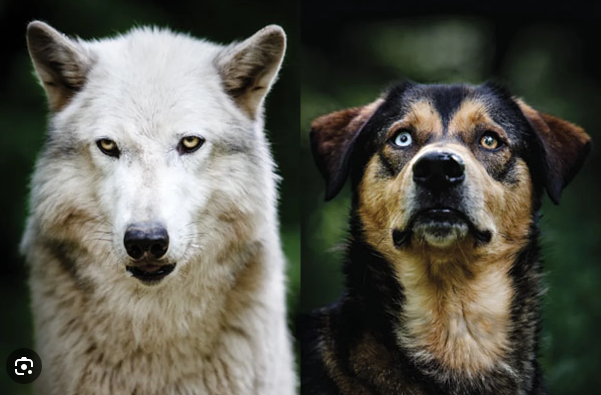
Ever wondered whether your precious pooch shares similarities with the mystical yet menacing wolf? Because they do!
Dogs who are similar in size to wolves (e.g. huskies) have a life expectancy of around 14 years – which is the same as a wolf’s life expectancy in the wild.
A wolf has 42 teeth, which is the same as your four-legged pal – although, your pup’s teeth are far smaller.
Our canine companions have the same amount of chromosomes as wolves, which means they share almost 99% of their DNA with each other!
Also, if your doggo loves digging, they have something in common with wolves, who dig to find food, make dens, and stay cool in warm weather.
Differences between dogs and wolves
Despite their similarities, dogs and wolves differ in many ways:
Domesticated dogs are naturally trainable, whereas wolves are not.
While your pet puppy started socialising at four weeks’ old, a wolf puppy starts socialising at just two weeks!
Your best fur-iend may have the same number of teeth as a wolf, though their jaws are completely different. A wolf’s jaw is much bigger and stronger than a dog’s, because your pooch’s teeth have evolved to eat softer food.
Can dogs and wolves breed with each other?
Yes, it is possible for dogs and wolves to produce pups!
In fact, there’s a type of canine called a ‘wolf dog’, who has a mix of dog and wolf DNA (making them a ‘hybrid’ species). However, dogs and wolves don’t tend to interact by choice, which means a wolf dog is a human creation that wouldn’t happen in nature.
It’s important to note that wolf dogs are wild animals, so they’re not suitable as pets.
Why do dogs howl?
Howling is perhaps the most recognisable similarity between dogs and wolves.
Wolves howl to communicate with their pack, though your clever canine companion has developed howling styles to communicate in different ways!
Dogs can howl to let you know they’re anxious or stressed, though they may also howl while singing along with sounds on the TV or ‘chatting’ with you.
Dog breeds similar to wolves
If you were asked to describe a dog who looks like a wolf, you’d probably say the Alaskan malamute, Siberian husky, or Czechoslovakian Vlcak (CSV).
However, there are other dog breeds who are genetically similar to wolves that might surprise you:










